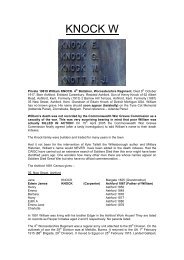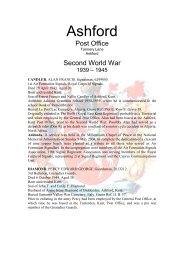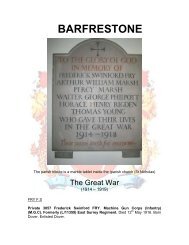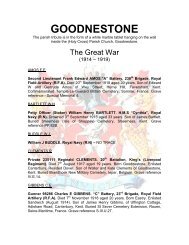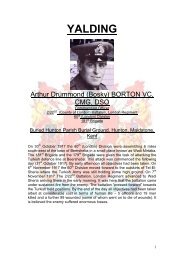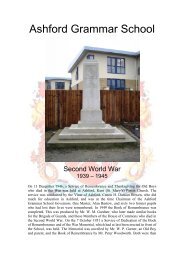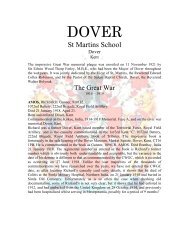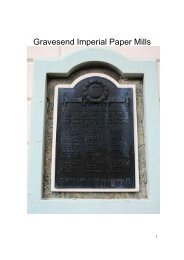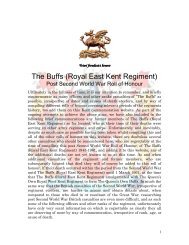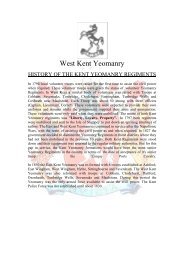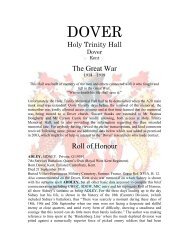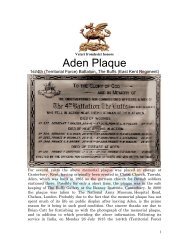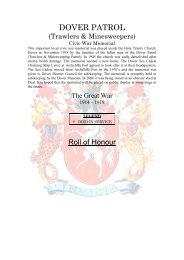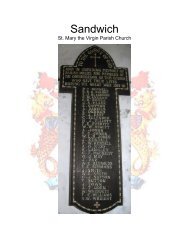batch 2.2 - Kent Fallen
batch 2.2 - Kent Fallen
batch 2.2 - Kent Fallen
Create successful ePaper yourself
Turn your PDF publications into a flip-book with our unique Google optimized e-Paper software.
David Hughes, Neil Clark, Kyle Tallett<br />
<strong>Kent</strong> War Memorials Transcription Project<br />
http://www.kentfallen.com<br />
Email: clarkneil@hotmail.co.uk<br />
Tuesday, February 05, 2008<br />
Miss. Maria Choules<br />
Records Supervisor<br />
Commonwealth War Graves Commission<br />
2 Marlow Road<br />
MAIDENHEAD<br />
Berkshire<br />
Re: Additional Non-Com Submissions<br />
Private 347 Alfred FLINT. 5 th Buffs (East <strong>Kent</strong> Regiment)<br />
Sergeant T/1050 Albert Arthur BENZ. 5 th Buffs (East <strong>Kent</strong> Regiment)<br />
Thank you for advising me of the MoD (Army) latest adjudications (our Batch 2). The news<br />
cheered us all up no end I can tell you! Proof indeed that this work can be done expediently,<br />
professionally and without the kind of ridiculous delays we have come to expect with all our<br />
non army submissions. The Naval Historical Branch should hang their heads in shame!<br />
We have never had cause to complain about any army adjudication as they all appear fair to<br />
the man and just from a law perspective. Unlike the Naval Historical Branch, whoever does<br />
this excellent work on the army’s behalf quite properly gives the man the benefit of any doubt<br />
when it arises.<br />
To date we have submited 29 cases, 21 of which have now been approved (plus 2 navy<br />
appeals STILL outstanding after 4 years – Hoskins H.F / W.R Page)!<br />
I have attached two further cases which perhaps you would kindly ask the army to look at –<br />
Arthur Flint. In the first instance we deided not to submit this case because the death<br />
certificate gave a cause of death unlikely to have been caused as a consequence of war.<br />
However, looking closer at the case it became apparent that the authorities made an error of<br />
judgment which was eventually overturned after his death. The story is not straightforward<br />
and upon reflection we are now firmly of the opinion that this man does qualify for official war<br />
casualty status and deserves his sacrifice to be commemorated by the country he gave his<br />
life for.
The second submission – Albert Arthur Benz is somewhat more clear cut, he quite obviously<br />
died of wounds received in Mesopotamia a year or so after being evacuated home and<br />
susequently medically discharged.<br />
Would you please kindly acknowledge safe receipt of this letter together with enclosures. It’s<br />
sufficient to send me an email.<br />
Thank you kindly for your valued assitance in these matters.
1. FLINT A<br />
Willesborough War Memorial<br />
Service Papers on CD<br />
Death Certificate on CD<br />
Private 347 Alfred FLINT. 5 th Battalion, The Buffs (East <strong>Kent</strong> Regiment). Formerly 53 rd<br />
(East <strong>Kent</strong> Company) Imperial Yeomanry (Boer War) 1900-1902. Formerly (7878) 1 st<br />
Volunteer Battalion, The Buffs, (East <strong>Kent</strong> Regiment). Died 26 th April 1920 Appendicitis<br />
(blood poisoning) aged 44 years. Husband of Sarah Bessee Martha Flint of 18 Gladstone<br />
Road, Willesborough, Ashford, <strong>Kent</strong>. Brother of L Lewis, 1 Avenue Gardens, Dover, <strong>Kent</strong>.<br />
Buried Ashford (Wilesborough) Cemetery, Church Road, Willesborough, Ashford, <strong>Kent</strong>. Grave<br />
reference unknown at this time (this can be obtained if required).<br />
The cost of Alfred’s funeral was paid for in full by his wife Sarah. Her repeated requests to be<br />
re-imbursed were turned down in the first instance. In 1921 the full costs were finally paid<br />
back by the War Office.<br />
Alfred’s name is NOT recorded as a war casualty by the Commonwealth War Graves<br />
Commission but his name DOES appear on the Willesborough civic war memorial and roll of<br />
honour. His death was widely reported in the local papers which mentioned that his cause of<br />
death was as a consequence of his service during the war.<br />
Alfred served in the Imperial Yeomanry (1 st Volunteer Battalion, The Buffs) from 2 November<br />
1892 until 30 November 1896. He saw extensive service with the Buffs (Volunteers) (Imperial<br />
Yeomanry) during the South African (Boer) War 1899-1902. He was awarded the Queen’s<br />
South Africa Medal with a clasp for Cape Colony and the Kings South Africa Medal with clasp<br />
1899-1902. His service papers confirm he served there from 1900 until January 1902. Alfred<br />
re-enlisted into the Territorial Force (5 th Buffs) in 1908 as a Private soldier. The 5 th Buffs were<br />
based at Ashford’s Drill Hall in Newtown Road.<br />
Prior to the outbreak of war Alfred was employed in the Ashford (SE&CR) Railway Yards as a<br />
Machinist. In his spare-time he served in the Territorial Force at Ashford Drill Hall with his<br />
former regiment (5 th Buffs). He never returned to employment after he was discharged from<br />
the army because of health problems.<br />
On 2 December 1914 Alfred moved to India with the 5 th Buffs. He remained in India until 11<br />
September 1916 when he was sent home unfit for further war service. (total service in India 1<br />
year 180 days). His battalion had moved to Mesopotamia earlier and it appears that when the<br />
battalion moved, Alfred must have still been ill and remained in India being treated in hospital.<br />
When Alfred arrived back in the UK he was discharged unfit for further war service and<br />
awarded a Silver War Badge (SWB) indicating that the authorities recognised that his injuries<br />
or illness at the time of discharge was due to his war service. For some unknown reason<br />
Alfred was NOT awarded an army pension at this time which is surprising given the<br />
circumstances. It is probably that the authorities only credited him with 2 years war service<br />
during the Great War. The fact he served in the Territorial Force for so many years (including<br />
full time service during the Boer War) was not taken into consideration. Obviously this was a<br />
huge mistake because AFTER Alfred had died his wife was awarded a full Widows Pension.<br />
There is good evidence of a complete admin “cock up” because his wife also had to request<br />
his Territorial Efficientcy Medal after he had died!<br />
When Alfred was discharged unfit for further war service he was awarded a Silver War Badge<br />
(SWB) indicating illness or injury as a consequence of war service.<br />
After Alfred died his wife embarked on a tedious campaign to obtain a widows war pension.<br />
She wrote her husband “had been sick ever since he returned from India in 1916”. This<br />
matter was dealt with by the Widows Appeal Section, Ministry of Pensions, Victoria Tower<br />
Gardens, London (evidenced by a letter dated 10 November 1920.
Our first feeling that was the cause of death was not related to his war service. But having<br />
looked closer it became obvious that was not the full story - His wife wrote to the authorities<br />
on countless occasions before going to formal appeal where the decision finally went in her<br />
favour. The Ministry of Pensions eventually over-turned the previous adjudications which<br />
denied her a war widows pension.<br />
It must have been so damn hard for her trying to bring up Alfred’s kids on her own! As if she<br />
hadn’t had enough to contend with losing her husband. It is highly probable that his death<br />
certificate does not give the full cause(s) of death. Alfred’s wife was adament that here<br />
husband was ill ever since he arrived home from India. We think that Alfred deserves his<br />
sacrifice to be recognised by the country he served so gallantly in two conflicts (Boer<br />
War/Great War). He should be given the benefit of any doubt, not that there can be much<br />
doubt because the Ministry of Pensions awarded his wife a widows war pension. It was<br />
notoriously hard to have Ministry of Pensions adjudications overturned therefore the evidence<br />
his wife produced must have been extremely compelling.<br />
Alfred’s service papers record some of his wifes written protestations as well as the final<br />
appeal ruling in her favour.<br />
Letter from Sarah Flint 2 May 1920 to Army<br />
“I received discharge papers quite safe. Sorry to have not written by return but I quite forgot. I<br />
have had such an upset. My husband passed away at the Ashford Cottage Hospital on 26 th<br />
April. He leaves a widow and 4 young children. He has been ill ever since he came home<br />
from India.”<br />
Yours Faithfully<br />
Sarah Flint<br />
This letter clearly infers that Alfred never returned to ful health after he was discharged from<br />
the army.<br />
DEATH CERTIFICATE<br />
Alfred FLINT<br />
Machinist Railway<br />
1. Appendicitis (1.5 months)<br />
2. Faecal Fistula ?<br />
Death registered by his wife – Sarah B.M Flint of 18 Gladstone Road, Willesborough, Ashford,<br />
<strong>Kent</strong>.<br />
__________________________________________________________________________<br />
The 1881 Census –<br />
St John Villas, Cudworth Road, Willesborough, Ashford, <strong>Kent</strong><br />
Alfred FLINT 6 Willesborough 1875<br />
Albert STANLEY 19<br />
Edward 17<br />
Elizabeth 3<br />
Jeremiah 60<br />
Mary A 12<br />
Rose 59<br />
Sarah A 10<br />
Sussanah 15<br />
Thomas 25
After Alfred had died his wife wrote to the Army asking why he had not been awarded the<br />
Territorial Efficiency Medal after 18 years volunteer service. The Army wrote back explaining<br />
that there had been an error due to the outbreak of war in 1914 and that this had resulted in<br />
the medal not being awarded on time! In any event the medal was sent to his widow almost<br />
immediately. At the same time she was awarded a full Widows War Pension by the Minstry of<br />
Pensions. Someone had obviously made a huge mistake by not awarding a Disability Pension<br />
to Alfred when he was discharged from the Army. The same mess up resulted in his Terrorial<br />
Medal not being awarded.<br />
A Flint (53 rd Coy, Imperial Yoemanry) 1901<br />
3 rd Row 3 rd from Left
2. BENZ A.A<br />
Marden War Memorial<br />
Sergeant T/1050 Albert Arthur Benz. 5 th Battalion, The Buffs (East <strong>Kent</strong> Regiment). Died<br />
of wounds 21 st September 1918, aged 31 years. Born Stoke Newington, London 1887. Son of<br />
Sebastian Peter Benz and Mary Ann Benz, née Steel. Albert was seriously injured on 21 st<br />
January 1916, receiving a gunshot wound during an attack on the Turkish lines at Umm-el-<br />
Hanna, Mesopotamia (Iraq). Three weeks later, on 10 th February, he was sent back to India<br />
recover from his injuries, but on 7 th May 1916, having failed to show any improvement, he<br />
was transferred to the Regimental Depot, and returned to England. Place of burial unknown at<br />
this time.<br />
Discharged 20 February 1917 “no longer fit for war service” after serving (pre war) 4 years,<br />
140 days.<br />
His father – a German national who came to England in the 1860s to work as a baker – died<br />
in 1897; his mother remarried the following year, and by 1901 the family were living in the<br />
village of Tenterden in <strong>Kent</strong>, where Albert’s stepfather, James Henry Clarke, worked as a gas<br />
engineer. Albert himself was for some time employed at the Staplehurst Gas Works, and<br />
afterwards worked as a labourer in the nearby village of Marden, where he married Ellen Kate<br />
Preston on 15 th April 1909. Albert and Ellen lived at Howland Road, Marden and 2 Albion<br />
Road, Marden, and had two children – Mabel Louise, who was born in Marden on 7 th June<br />
1910 and baptised in Marden on 14 th August 1910, and Dorothy May, who was born in<br />
Marden on 24 th November 1912 and baptised in Marden on 9 th February 1913.<br />
Soon after moving to <strong>Kent</strong>, Albert enlisted in the county’s Territorial Force, serving with the<br />
1/5 th (The Weald of <strong>Kent</strong>) Battalion of The Buffs (East <strong>Kent</strong> Regiment). He left the regiment at<br />
the end of his initial term of service with the Territorials, but subsequently re-enlisted at<br />
Staplehurst on 1 st November 1912 at the age of 25 years 7 months, rejoining his old Battalion<br />
for a further term of 4 years. Albert attended annual training at Seaford from 27 th July 1913 to<br />
10 th August 1913, and at Longmoor Camp to Salisbury in the summer of 1914. When war was<br />
declared on 4 th August 1914, the 1/5 th Buffs were at the Drill Hall, Ashford, as part of the <strong>Kent</strong><br />
Brigade, Home Counties Division. The following day, Albert was promoted to Lance Corporal.<br />
Over the next few weeks, the Battalion moved to Dover, then to Canterbury, and later to<br />
Sandwich for training. Finally, the 1/5 th Buffs were despatched to India, as replacements for<br />
the regular units that had been recalled to England at the outbreak of the war. The Battalion<br />
sailed from Southampton on 30 th October 1914; on the same day, Albert was promoted to<br />
Corporal.<br />
After arriving in India on 3 rd December 1914, the 1/5 th Buffs were assigned to garrison duty in<br />
Kamptee, near Madras. Albert continued his climb through the ranks; on 8 th March 1915 he<br />
was promoted to Sergeant. At the end of 1915, the 1/5 th Buffs transferred to the Persian Gulf,<br />
where they were to remain for the rest of the war. The Battalion disembarked at Basra on 1 st<br />
December 1915, and joined the expedition to relieve the British forces at Kut, where the 6 th<br />
(Indian) Division was besieged by superior numbers of Turkish troops. However, Albert was<br />
seriously injured on 21 st January 1916, receiving a gunshot wound during an attack on the<br />
Turkish lines at Umm-el-Hanna. Three weeks later, on 10 th February, he was sent back to<br />
India to recover from his injuries, but on 7 th May 1916, having failed to show any<br />
improvement, he was transferred to the Regimental Depot, and returned to England. Albert<br />
was posted on to the 4 th (Reserve) Battalion of the Buffs on 10 th October 1916, and on 20 th<br />
March 1917 he was discharged from the army “in consequence of being no longer physically<br />
fit for war service. He subsequently died of these wounds just over a year later at the age of<br />
31 years.<br />
Albert Benz is commemorated on the War Memorial in Marden, which suggests that the<br />
trustees of the memorial were satisfied that his death was caused by or aggravated by his war<br />
service. However, he does not appear on the Commonwealth War Graves Commission’s<br />
“Debt of Honour Register,” nor is he mentioned in “Soldiers Died in the Great War,”<br />
presumably because he died after being discharged. We believe there is a very strong case<br />
for Albert’s name to be added to the CWGC register.<br />
to



